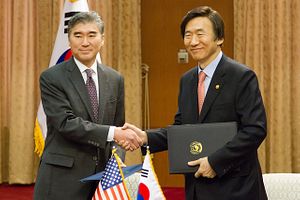U.S. President Barack Obama has made the strategic rebalance to the Asia-Pacific a cornerstone of his foreign policy. Under this policy, the United States will allocate more resources to the Asia-Pacific region, including South Korea. However, around the time that the Obama administration was introducing the strategic rebalance policy, Congress passed the Budget Control Act of 2011. The act mandates cuts across U.S. government spending, known as sequestration, and includes cuts to the defense budget. Congress designed the mechanism of sequestration to present legislators with an incentive to overcome domestic partisan disagreements about passing a budget that included tax hikes and spending cuts, but attempts at compromise failed and the deep percentage-driven cuts mandated under the act took effect. The arbitrary nature of the sequestration has reduced the ability of the U.S. Department of Defense to plan resource allocation strategically. Ongoing contingencies in the Middle East and Eastern Europe that require U.S. attention and resources have exacerbated the problem.
As the United States reduces its military budget by $487 billion in planned cuts over the next ten years on top of a potential additional $500 billion in cuts mandated by sequestration, South Korea will have to assume more responsibility for its own defense. For South Korea, the reduction of the size of the U.S. Army to its lowest level since the end of World War II is of particular concern because any major North Korean contingency would require a massive ground force to stabilize the peninsula. South Korean analysts see the troop cuts, as well as U.S. reluctance to become involved in operations in places like Syria, as signs that South Korea needs to increase its ground force capabilities. Indeed, the ROK has announced a 5.3 percent increase in defense spending for 2015, the highest rate of defense growth since 2011.
U.S. defense austerity will continue to play a role in burden sharing agreements, known as Special Measures Agreements (SMA). SMA talks have occurred between the two allies every five years since 1991, when the ROK first started paying some of the costs of U.S. personnel and bases. The most recent SMA agreement was signed in 2014 and will last until 2018. In this agreement, South Korea will raise its contributions by 6 percent, for a total of $867 billion in 2014, and increase the amount of payment annually based on inflation. In addition to increased burden sharing, South Korea will gain greater control and transparency about how its funds are spent. Despite the increase, U.S. non-personnel spending for U.S. Forces in Korea have far outpaced ROK contributions: From 2008-2012, ROK contributions increased by $42 million, but U.S. costs increased by $500 million.
The negotiations of the SMA in 2014 were tense, and after the agreement was signed some ROK lawmakers called the agreement humiliating, and voiced concerns that the U.S. would use ROK funds for basing relocation in violation of a 2004 agreement not to do so. During the negotiations, there were anti-American protests in South Korea, and anger about the lack of transparency about how the United States used ROK taxpayer money. Another source of contention was that during the negotiations, the United States still had a surplus of 500 billion unused won worth of ROK contributions. However, the current SMA mandates that United States Forces Korea must make an annual report on the use of ROK funds to the National Assembly, and must seek approval from the Ministry of National Defense for every contract in which ROK funds are used. If the United States meets this obligation, it should go a long way towards reassuring South Korean citizens that the United States is using their funds in a responsible manner.
The contentious nature of burden sharing agreements is likely to continue. In the United States, especially during financially troubled times and austerity, congressmen have questioned why a rich country such as South Korea does not contribute more to the alliance. In South Korea, politicians on the left claim that the ROK is already paying more than their fair share of the burden, and dispute U.S. figures for ROK contributions. For example, current U.S. calculations of ROK burdens do not take into account potential rental revenue that the ROK foregoes by allowing the U.S. use of bases, or environmental costs imposed on local communities by U.S. bases. Since both sides are democracies that have to respond to citizen concerns over how tax money is spent, it is rational for the ROK to press for greater control and transparency when it comes to the funds it provides. However, other countries, such as Japan, provide more funding for U.S. basing and burdens and U.S. forces in Korea face a greater opportunity cost than U.S. troops based elsewhere in that they do not regularly deploy outside of the ROK. If the United States still faces significant funding limitations under the Budget Control Act when the current SMA expires in 2018, than the next SMA negotiation is likely to be contentious, with the United States pressing for even higher ROK contributions. Still, these issues might be addressed through means such as payment in kind, or to count a percentage of ROK money spent on U.S. weapons systems as going toward its defense obligation. This would allow both sides to present the agreement as a domestic win, and would allow the ROK to increase investment in U.S. equipment while further developing its own defense capabilities, a win-win.
Leon Whyte is a graduate of the Fletcher School of Law and Diplomacy at Tufts University as well as the Senior Editor for the Current Affairs section of the Fletcher Security Review. His research interests include transnational security and U.S. alliances in East Asia. You can follow him at @leon_whyte

































